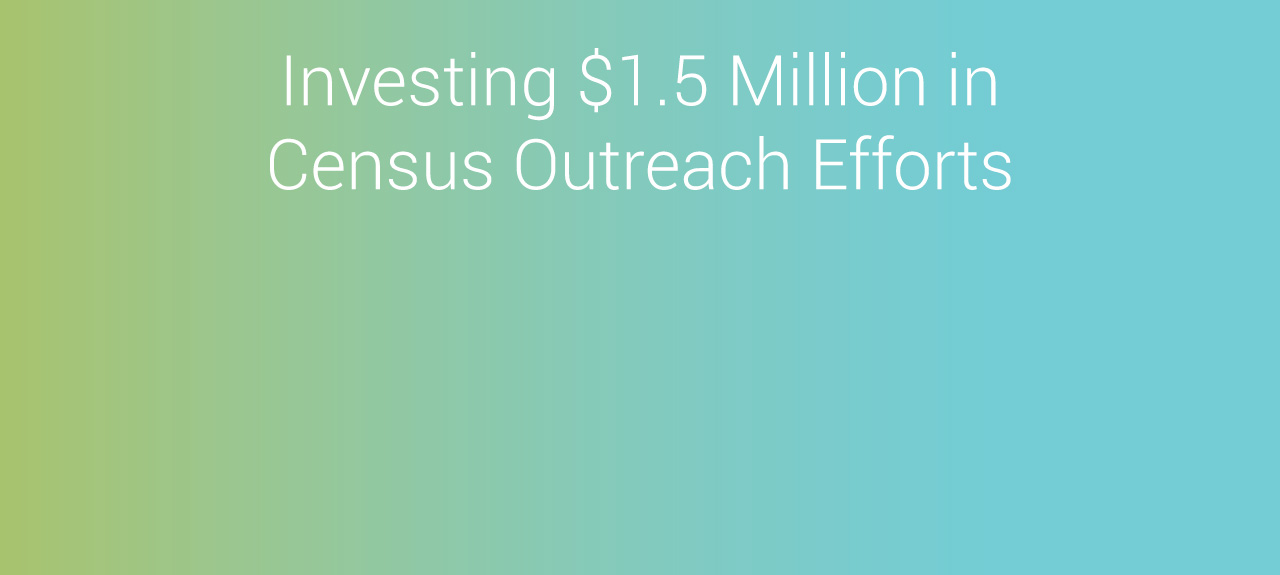Following Supreme Court announcement temporarily blocking citizenship question, philanthropy, King County and City of Seattle invest to address fears and ensure full and accurate count
While the Supreme Court’s ruling today delays a decision on the inclusion of a citizenship question in United States Census 2020, two coalitions involving foundations and local government are announcing more than $1.5 million in grant awards to enable community-based organizations to conduct outreach and build confidence in hard-to-count communities in Greater Seattle and across Washington state.
The risks in Census 2020, which include a new online format, a lack of testing, and a shortage of federal funding for outreach, have been overshadowed by the effort to include a question that asks respondents if they are United States citizens. These risks, coupled with concerns over privacy, remain despite the Supreme Court’s ruling that temporarily blocks the question and delays a final decision on the issue.
The Regional Census Fund, established by Seattle Foundation, King County and the City of Seattle, is investing $710,000 through 21 grants to nonprofits serving historically underrepresented communities in Greater Seattle, including communities of color, immigrants and refugees, native people, LGBTQ residents and others. Regional Census Fund grant recipients are:
- Asian Counseling and Referral Service
- Byrd Barr Place
- Chinese Information and Service Center (CISC)
- Cierra Sisters
- Coalition of Immigrants, Refugees and Communities of Color (CIRCC)
- Eastside Refugee and Immigrant Coalition
- Hearing, Speech & Deaf Center (HSDC)
- India Association of Western Washington
- Khmer Community of Seattle King County
- Lake City Collective
- Latin Empire of Seattle
- LGBTQ Allyship
- MAPS (Muslim Association of Puget Sound-MCRC (Muslim Community Resource Center)
- Mujer Al Volante/Women Driving
- Restore Assemble Produce
- Seattle Chinatown International District Preservation and Development Authority
- Seattle/King County Coalition on Homelessness
- Somali Health Board
- South Park Senior Citizens
- United Indians of All Tribes Foundation
- West African Community Council
“This investment by philanthropists and local government is extraordinary in Washington state, highlighting the risks in the upcoming count and the far-reaching consequences for the public and private sectors,” said Tony Mestres, president and chief executive officer of Seattle Foundation. “The impacts of an inaccurate count will simply compound the significant inequities in our communities and hurt people who are already underserved.”
Philanthropy Northwest’s Washington Census Equity Fund, a statewide pooled fund of 25 philanthropy partners, announced $800,000 in grants to 28 nonprofits and tribes providing outreach, education and resources to ensure a robust and accurate census count. A list of grant recipients can be found here.
“This unprecedented partnership lays the groundwork for future joint philanthropic efforts, with a proven model of more inclusive and responsive collaboration that can be nimble and responsive to community needs,” said Kiran Ahuja, CEO of Philanthropy Northwest.
“It is vitally important that the federal census counts every person here in King County, and to make that happen, we must overcome continuing efforts by the White House to politicize and corrupt this basic process, said King County Executive Dow Constantine. “We are ramping up our work now, partnering with local organizations to reach historically under-represented communities and encouraging people to participate. Nothing less than the health and security of our region is at stake.”
“Seattle’s community-based organizations are trusted by the communities they serve, and the Regional Census Fund and Washington Census Equity Fund will help them do the important work of reaching out to community, building trust, and preparing for the 2020 Census,” said Seattle Mayor Jenny A. Durkan. “Our country is still grappling with its history of exclusion and systemic racism in which people have deliberately not been counted, or been counted as less than a whole person, to dehumanize them and take away their resources. Despite what this president thinks, in Seattle we know that everyone counts, and everyone deserves to be counted.”
The census is intended to count every resident of the United States and provide a detailed look at households so that it can serve as the foundation for key indexes that monitor demographics used to inform decisions by government (including federal funding and congressional redistricting), businesses, nonprofit organizations, schools and more. A robust and accurate census matters to philanthropy, a sector committed to promoting vibrant and equitable communities, because philanthropy relies on data to better direct resources to the most critical populations and issues in the region.
The Census Bureau estimates that Washington State received a total of $16.7 billion or $2,321 per person in federal funds in 2016. Each person counted leads to significant resources to support critical programs and services including transportation, health care, education and housing.
Seattle Foundation’s Regional Census Fund and Philanthropy Northwest’s Washington State Census Equity Fund collaborated to provide nonprofit organizations with a common application portal and a shared funding process. The Regional Census Fund focuses on work in King County while the Washington Census Equity Fund focuses on efforts across the state, outside of King County.
About the Regional Census Fund
Seattle Foundation contributed $500,000 to this effort and is administering the fund. The City of Seattle and King County each invested $250,000 for a total of $1 million. Launched on April 15, it supports trusted community-based organizations to conduct effective outreach in hard-to-count communities including organizing, educating and activating residents in historically underrepresented communities, including communities of color, immigrants and refugees, native people, LGBTQ residents and others.

